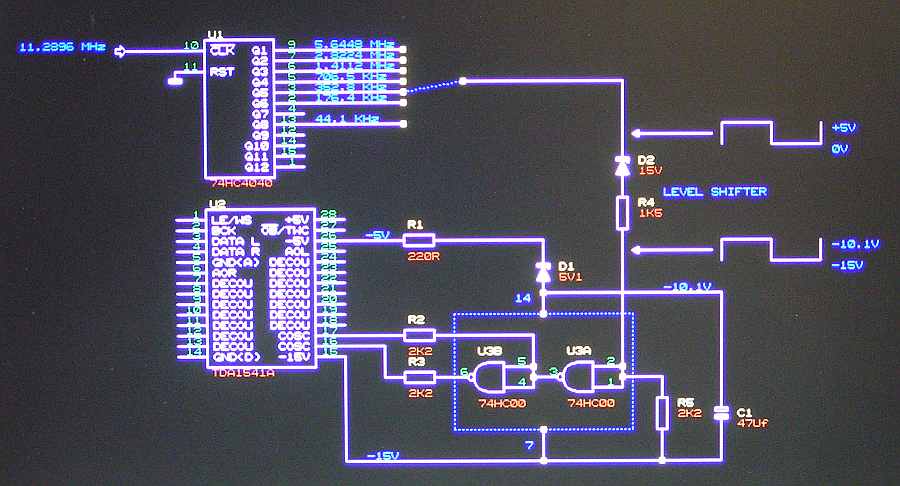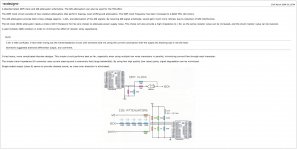Has anyone tried the DEM circuit as per post #3063 from Ecdesign (44.1 KHZ from a schottky diode connected to the WS signal) ?
Reagrds.
Paul
Reagrds.
Paul
Sorry for the mistake. This is the first circuit i have tested, but it doesn't work well with me. http://www.diyaudio.com/forums/digital-line-level/146841-4xtda1541a-nos-dac-project-7.html#65
Hi fastvideo,
I guess you must have taken the wrong output of the 74HC4040, since the output frequency is twice as high as intended. What signal is at pin 2 of the 74HC00? You have to verify that the signal is 352,8 KHz at that point.
I saw a bit too late that you already have a working circuit🙂
Do you know what frequency sounds best when using 220nf decoupling caps?
@gnomcat:
You're welcome. I wish you the same 😉
@Sandor:
Sorry, haven't tried that yet, maybe I'll test it in my test-cd471 cd-player!
Kind regards,
Joris
Hi fastvideo,
I guess you must have taken the wrong output of the 74HC4040, since the output frequency is twice as high as intended. What signal is at pin 2 of the 74HC00? You have to verify that the signal is 352,8 KHz at that point.
I saw a bit too late that you already have a working circuit🙂
Do you know what frequency sounds best when using 220nf decoupling caps?
@gnomcat:
You're welcome. I wish you the same 😉
@Sandor:
Sorry, haven't tried that yet, maybe I'll test it in my test-cd471 cd-player!
Kind regards,
Joris
I use 330nf and 10uf ELNA audio caps pin 13 and 18. dual tda1541a with lme49720 metal case opamp for I/V and output in a Rotel rcd855.
352.8 khz has a noticeable better sound than 176.4khz and 44.1khz.
also tested up to 2.82 mhz. It works ok.
I use 330nf and 10uf ELNA audio caps pin 13 and 18. dual tda1541a with lme49720 metal case opamp for I/V and output in a Rotel rcd855.
352.8 khz has a noticeable better sound than 176.4khz and 44.1khz.
also tested up to 2.82 mhz. It works ok.
Hi fastvideo,
I have 220nf and 15uf Sanyo OS-con caps on pins 13 and 18. Tube output stage with 6c45 russian tubes.
When you turned up the frequency, did you experience a sound improvement in any way?
I'll try the higher frequencies soon.
Kind regards,
Joris
Joris,
I did not see big difference @2.82mhz, but you should try and share the experience.
My unit is in NOS mode and sound very good with this Dem reclock.
How is the tube stage compare with opamps?
I am looking for a reliable low voltage tube stage circuit now, any suggestions?
I did not see big difference @2.82mhz, but you should try and share the experience.
My unit is in NOS mode and sound very good with this Dem reclock.
How is the tube stage compare with opamps?
I am looking for a reliable low voltage tube stage circuit now, any suggestions?
Last edited:
Joris,
I did not see big difference @2.82mhz, but you should try and share the experience.
My unit is in NOS mode and sound very good with this Dem reclock.
How is the tube stage compare with opamps?
I am looking for a reliable low voltage tube stage circuit now, any suggestions?
Hi fastvideo,
I'll try the 705,6 KHz soon. Since you say there's not much inmpovement by turning up the frequency to 2.82 mhz, I won't try that.
Mine is NOS as well, I'm only having a problem with mid-low, but that may have something to do with my amplifier...
I haven't tried any opamps yet, I went for the tube output straight away, since that was in the original design. (here)
This is the first DAC I ever built by the way. (actually the very first apparatus😛)
The voltage at the tubes isn's too high, it is only 230 volts.
Kind regards,
Joris
Has anyone tried the DEM circuit as per post #3063 from Ecdesign (44.1 KHZ from a schottky diode connected to the WS signal) ?
Reagrds.
Paul
Yes, a few days ago. It didn't work.
I used a scope to adjust and it looks like I got a triggering even though I didn't get as good looking scope picture as Ecdesign posted.
Occassioanlly there was a high hiss when trying to listen to some music. Different hiss with different TDA's 😕
I am running this circuit from ECdesigns... it is working nicely and provides a clean DEM clock signal.
Made a very noticeable improvement as others have noted.
johnk
Made a very noticeable improvement as others have noted.
johnk
Hi fastvideo,
I guess you have a different schematic. It sounds quite reasonable to connect the outputs through a resistor to -15v, but that is when the inverter outputs signals referenced to the ground. In this circuit, the signals are referenced to -15v already, so the connection to the -15v hasn't got to be made. The circuit works very well after a few tries, is it possible to increase the DEM frequency to 706,5 KHz? I'm willing to rewire the pcb, but I don't want to destroy my 2 TDA1541A's...
I must admit, after listening for some time, I noticed that there is better detail retrieval and tighter bass. This modification was worth the effort after all!
I attached the schematic EC drew.
Kind regards,
Joris
You mean the easy one from post #3063 ?
This one from ECDesigns.

Except I connected the the 74HC00 supplies close to the Power supply regulators, not at the 1541 pins and on other side of ferret beads that supply the DACs.
This one from ECDesigns.
Last edited:
Thanks
But then you need a master clock and I only have bad experience in reclocking my NOS design.
I have decided to go without any clock exept the one from the source.
Anyway, thanks again for a presumably working schematic.
But then you need a master clock and I only have bad experience in reclocking my NOS design.
I have decided to go without any clock exept the one from the source.
Anyway, thanks again for a presumably working schematic.
Last edited:
I am using BCK divided by 8.....whatever that pin is on the 74HC4040....
But I have 48 bit I2S from a CD-Pro that is reclocked with low jitter clock. So its BCK is a little slower....than 64 bit.
Seems to work very nicely....
johnk
But I have 48 bit I2S from a CD-Pro that is reclocked with low jitter clock. So its BCK is a little slower....than 64 bit.
Seems to work very nicely....
johnk
Last edited:
Can the Dem be clocked that fast as BCK? and is there an audio benefit from the higher speed?
Mine are parallel with independent dumping resistors.
jk
Mine are parallel with independent dumping resistors.
jk
Well I just gave 1 MHz dem clock a try.... didn't like it. Seem to add digital glare and was annoying at higher volumes ...
Went back to 264.6K. No edginess, very smooth natural highs with great definition & correct amount of shimmering...even at high volumes.... Just sounds right to me.
Might give 529.2K a spin.... Maybe depends on chips. I have four S1s.
jk
Went back to 264.6K. No edginess, very smooth natural highs with great definition & correct amount of shimmering...even at high volumes.... Just sounds right to me.
Might give 529.2K a spin.... Maybe depends on chips. I have four S1s.
jk
Can the Dem be clocked that fast as BCK? and is there an audio benefit from the higher speed?
jk
If i want to use the latest circuit from ecdesigns in the attachment for more than one TDA1541A, must i use only one 74HC02 ?
Could i simply parallel the output to Pin 16 & 17 ?
Have a look at Joris circuit in the right
PS. Grüße aus der Nachbarschaft (Anrath)
😛 Na die Welt ist klein!!
So only one 74xx for all TDA´s with decoupling R´s...
😛 Na die Welt ist klein!!
So only one 74xx for all TDA´s with decoupling R´s...
Only one 74hcxx with resistors will do. I tried to use one 74hc74 per TDA, but that made
things much worse. There was an awful lot of noise on the power lines, causing the logics to malfunction...
When anyone is building my design, please have a look at the 74hc4040 datasheet, I have misdrawn the schematics, the Q number is right, but the pin number doesn't match it.😉
Only one 74hcxx with resistors will do. I tried to use one 74hc74 per TDA, but that made
things much worse. There was an awful lot of noise on the power lines, causing the logics to malfunction...
Same at the schematics of ecdesigns ?
- Home
- Source & Line
- Digital Line Level
- TDA1541 DEM reclocking
